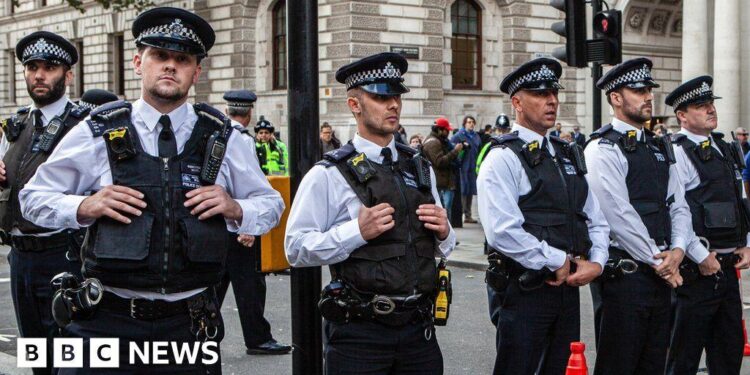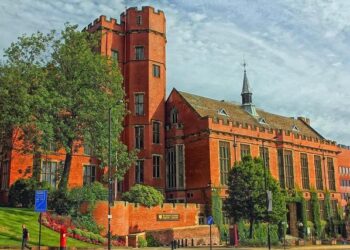British police arrested approximately 425 individuals during the latest demonstration organized by Palestine Action, a group recently proscribed by the UK government. The large-scale protest, held amid heightened tensions surrounding the Israeli-Palestinian conflict, saw activists defying the ban to voice their opposition. Authorities responded with a significant deployment, emphasizing the legal ramifications of participating in events linked to the banned organization. This development marks a significant moment in the ongoing debate over protest rights and counterterrorism measures in the United Kingdom.
UK Police Detain Hundreds in Largest Crackdown on Palestine Action Protests
In a sweeping operation marking the largest response to date, UK law enforcement detained approximately 425 individuals during recent demonstrations linked to the now-banned Palestine Action group. The crackdown unfolded across multiple sites around London where protestors sought to draw attention to their cause through a series of coordinated civil disobedience acts. Officers reported that many of those arrested were actively involved in obstructing public spaces, leading to significant disruptions in daily commuter traffic and local business operations.
The Metropolitan Police described the event as “one of the most challenging public order situations in recent years,” emphasizing their commitment to ensuring public safety while respecting the right to peaceful protest. Authorities deployed additional resources, including mounted units and tactical response teams, to manage the escalating tensions. Below is a summary of the enforcement measures and protest impact:
| Aspect | Details |
|---|---|
| Number of Arrests | ~425 |
| Primary Locations | Central London, Key Transport Hubs |
| Police Resources | Mounted Units, Tactical Teams, Hundreds of Officers |
| Disruption | Traffic Delays, Temporary Business Closures |
- Legal Context: The Palestine Action group had been proscribed earlier this year under new legislation targeting domestic extremism.
- Response: Protesters denounced the arrests as excessive, vowing to continue their activism via legal avenues.
- Official Statements: Police urged demonstrators to cooperate to avoid further escalation.
Implications for Public Order and Protest Rights Amid Rising Activism
Recent mass arrests at protests involving banned organizations highlight the ongoing challenge authorities face in balancing public order with the right to peaceful assembly. Law enforcement agencies are increasingly tasked with navigating complex legal frameworks while responding to acts of civil disobedience that often escalate quickly. These developments force policymakers to reevaluate how protest management strategies can ensure public safety without infringing on democratic freedoms.
Amid surging activism, the tension between maintaining order and respecting protest rights has intensified, raising several critical questions:
- How can police enforce bans on certain groups without suppressing broader movements?
- What measures ensure proportionality in the use of force during demonstrations?
- How might these incidents affect future legislation on public protests and civil liberties?
| Aspect | Potential Impact |
|---|---|
| Law Enforcement Tactics | More stringent, with faster intervention |
| Protester Response | Increased use of digital platforms for mobilization |
| Legal Framework | New debates on protest rights and security laws |
| Public Perception | Growing polarization around activism |
Recommendations for Balancing Security Measures with Civil Liberties in Future Demonstrations
Ensuring public safety during demonstrations without infringing on fundamental rights requires a nuanced approach. Authorities should prioritize transparent communication channels with protest organizers to establish clear guidelines and expectations ahead of events. This open dialogue fosters mutual understanding and can help prevent misunderstandings that often escalate into confrontations. Moreover, integrating specialized training for law enforcement on de-escalation tactics and cultural sensitivity is essential to mitigate unnecessary force and build trust within communities.
Implementing technology can also enhance the balance between security and civil liberties. For instance, the use of body cameras and real-time monitoring tools must be paired with strict privacy safeguards and oversight to avoid misuse. Below is a simplified framework of recommended practices for policing future demonstrations:
| Priority | Strategy | Expected Outcome |
|---|---|---|
| Communication | Pre-event dialogue and clarity on legal boundaries | Reduced tensions and clearer expectations |
| Training | Enhanced de-escalation and cultural sensitivity | Lower incidences of violence and bias |
| Technology | Body cams with privacy protocols | Accountability and protection of rights |
| Oversight | Independent monitoring of policing actions | Increased public trust |
Closing Remarks
The recent arrests mark a significant escalation in the UK authorities’ response to the banned Palestine Action group, underscoring ongoing tensions surrounding the Israeli-Palestinian conflict. As investigations continue, both police and activists remain poised for potential further demonstrations, raising questions about the future management of such protests and the broader debate over activism and public order in the UK.
















